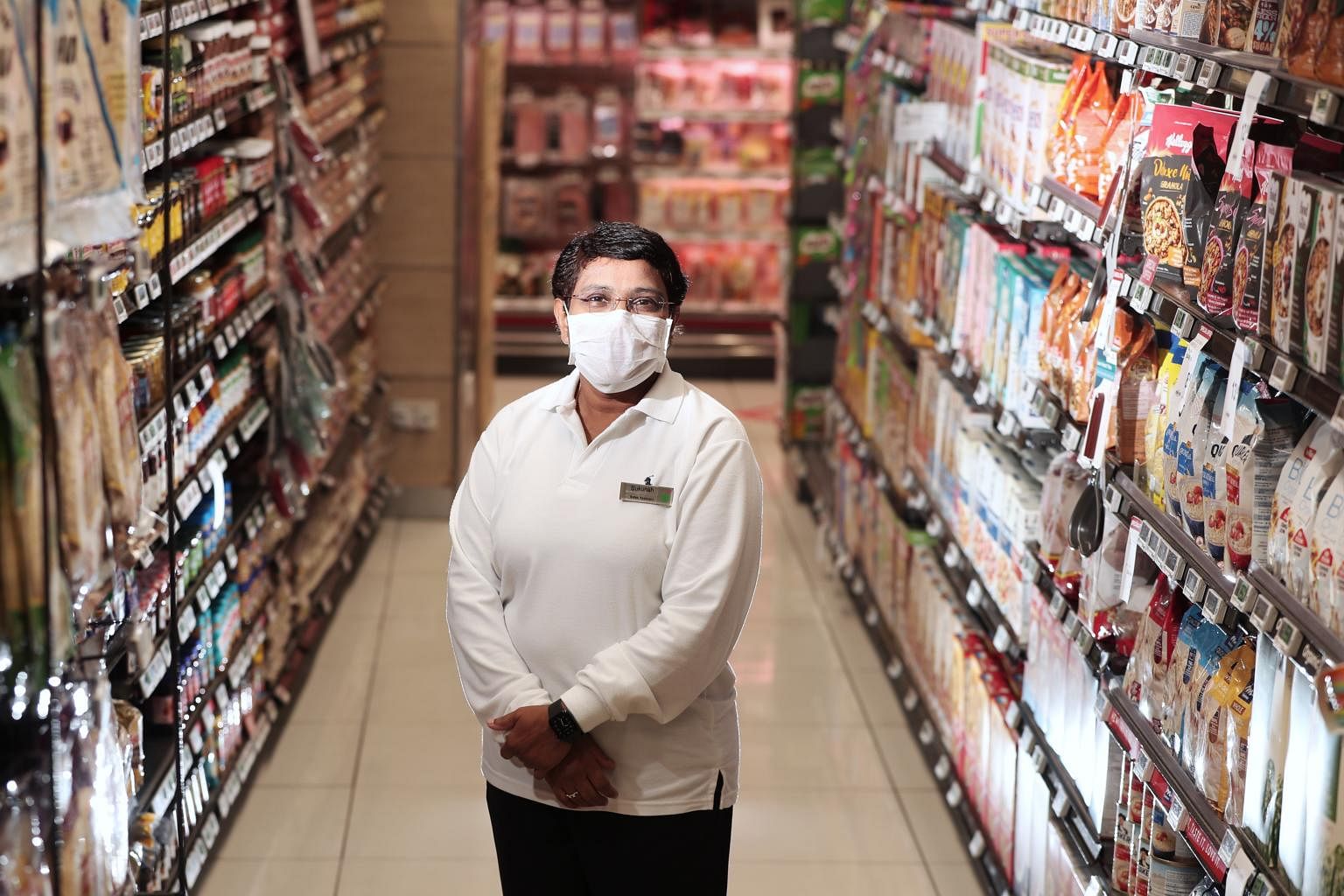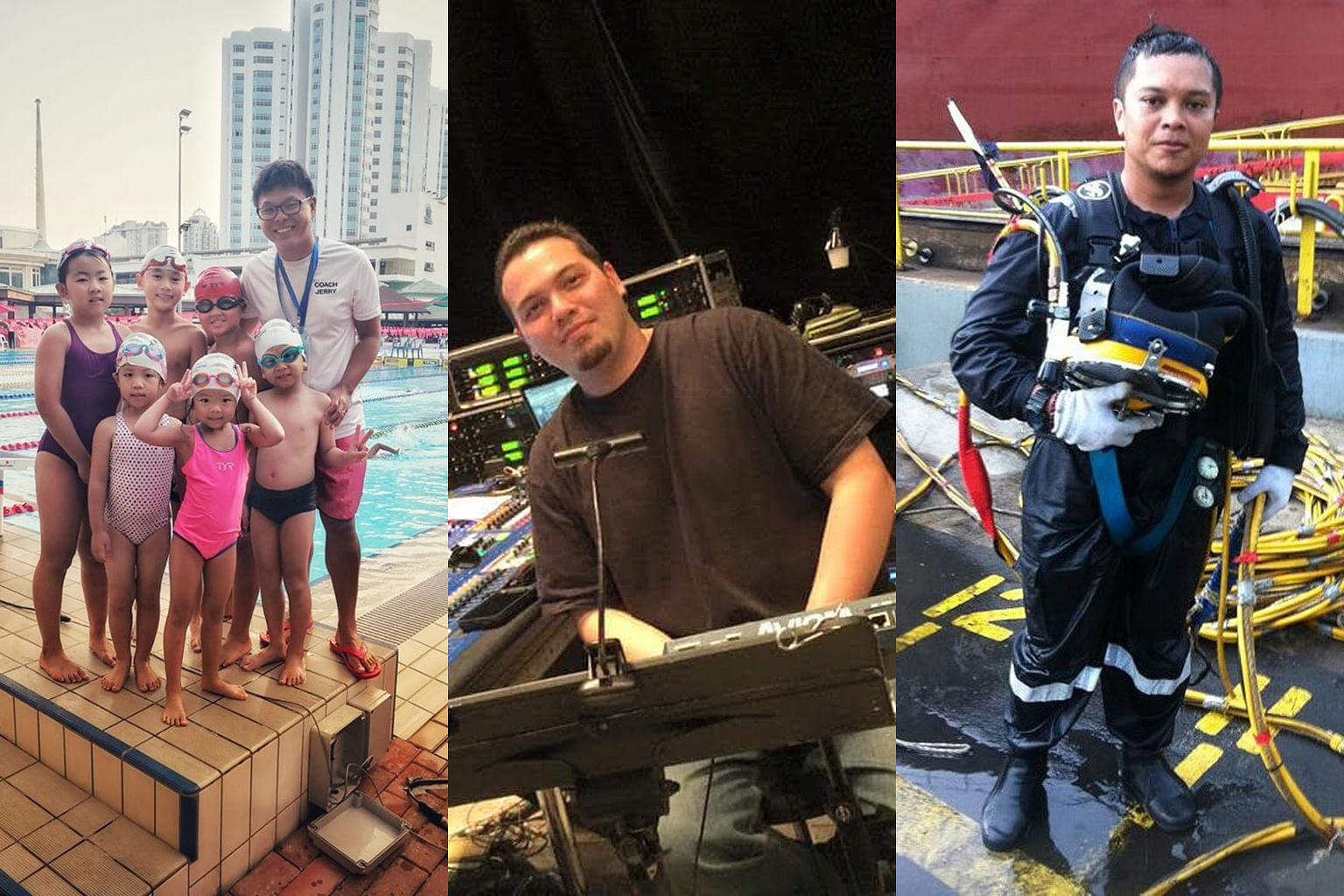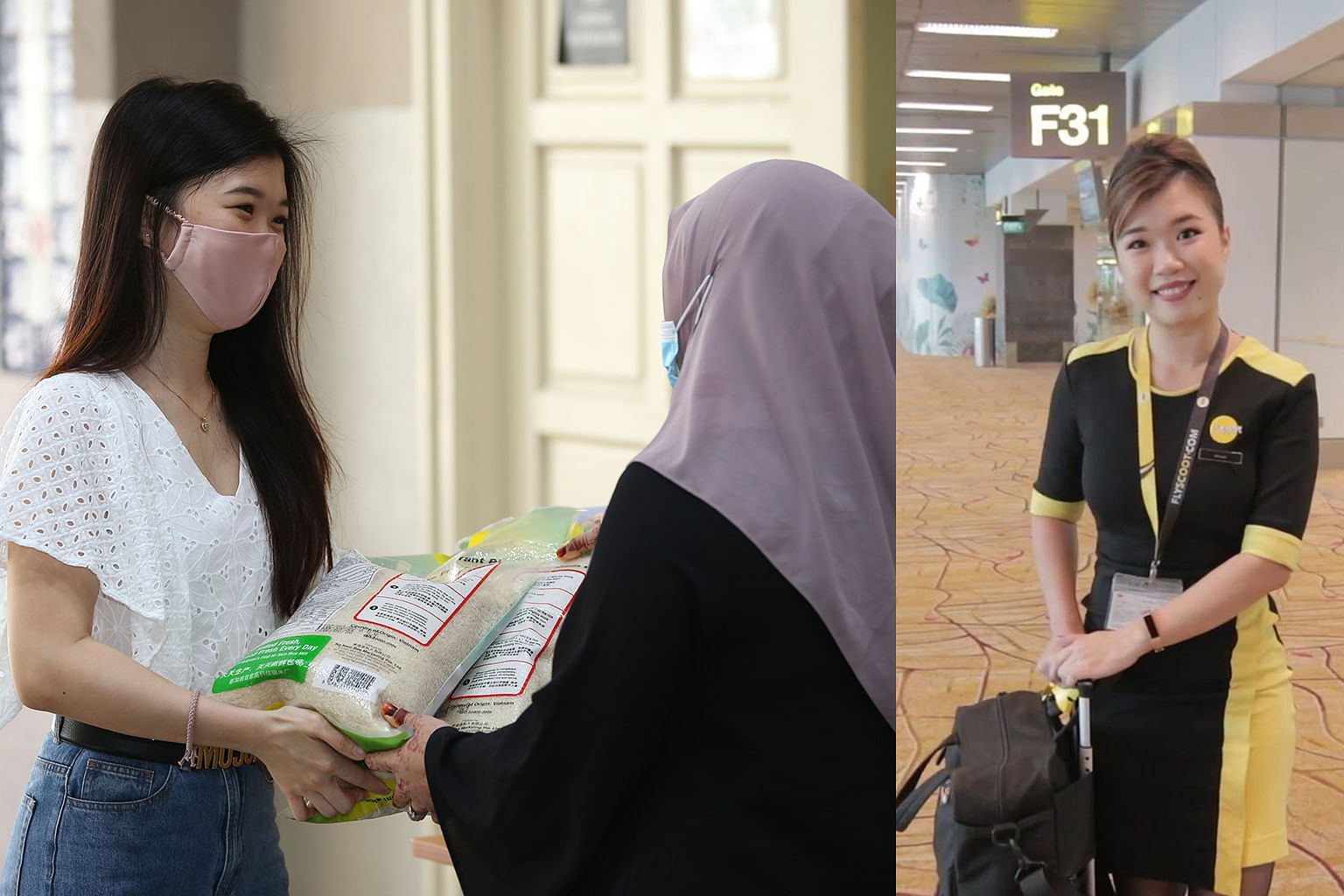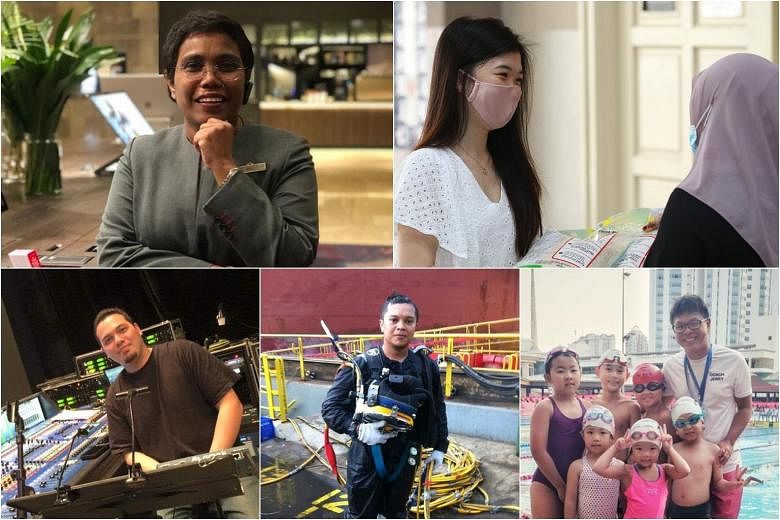Rolling with the punches
With Covid-19 crippling many industries such as travel, hospitality, events and exhibitions, many Singaporeans have been let go. Others have seen their livelihoods and incomes shrivel up.
Many more have had to step outside their comfort zones and ask what they can do to weather this storm.
In Parliament last month, Manpower Minister Josephine Teo spoke of a furloughed flight attendant who found work as a part-time cashier at Prime Supermarket, while waiting for the aviation industry to recover.
There are many stories of resilient Singaporeans, whose sectors, businesses and jobs were pulverised by the pandemic, but quickly pivoted to new professions, by being flexible and remaining open to new opportunities.
One of these belongs to Madam Rita Zahara, 51. She is part of the attractions operations team at Gardens by the Bay, which has been ensuring the smooth running of the Flower Dome and Cloud Forest at the Gardens since 2012.
But with the attractions closed since the circuit breaker, she worked as a safe distancing ambassador in housing estates during that period, and is now seconded to a community care facility, which cares for Covid-19 patients, with mild or no symptoms, in Tuas South.
The mother of four now assists the operational and medical teams at the community care facility to receive new residents, among other tasks.
"Though my working environment may have changed, I still see my role as one that is of service to people," she says.
Mr Duta Alamsyah, 39, a former portfolio manager with a luxury hospitality company, who has a master's degree in hotel management, has been working as a swabber with the Health Promotion Board since last month.
He was retrenched from his previous company after the Covid-19 fall-out. "I accept the reasoning behind my redundancy as the whole industry is not doing well at this time," he says with a shrug.
"Covid-19 is such a worldchanging event that, in this situation, I think it is best to be flexible and willing to try and learn new things."
Curious about the swabber job - which he came across online - and wanting to contribute to the fight against the disease, the bachelor decided to take up a six month contract.
His work setting has shifted from an air-conditioned office to a regional screening centre, where he dons full personal protective equipment for hours, but he feels he has transited well.
"My 15 years in the hospitality industry has trained me to work well with people. So when clients come to me nervous and shaking, I will calm them down and make them feel at ease when being swabbed.
While he acknowledges that his current pay is lower than before, he says: "The fulfilment I get from a job is not just about money."
Being a swabber has also introduced him to the healthcare industry and opened his eyes to its "many opportunities", which he is considering to explore further.
Mr Alvin Wong, 56, a former limousine driver, used to ferry businessmen and tourists to and from the airport.
But business started drying up after Chinese New Year and the father of three had to find an alternative income.
In April, he started working with ride-hailing operator Ryde, doing up to 20 trips a day. Since the start of phase two on June 19, business has picked up, such that he now makes more than enough to cover his running costs. He also gets an additional weekly payout of $70 from Ryde as part of their driver support package, as well as $70 a week from the Government's Special Relief Fund.
Mr Wong says: "I do not see tourism or international travel picking up for at least another year. So I intend to stick with Ryde for the foreseeable future."
By venturing out, he is not the only one seeing some permanence in his new gig.
Mr Lennie Lee, who used to work in the now-dormant events and exhibitions industry, now runs an online pet store on e-commerce platform Shopee. It sells pet food, accessories and grooming supplies.
The 48-year-old, who owns two dogs, set up the online store in April, as an extension of a physical pet store run by one of his relatives.
"I think I am blessed to have found a way to do something that I like during this difficult time, while still making ends meet," says the father of two .
"Many others are facing difficulties now."
Setting up the store had its challenges, such as having to sort out payment options and the logistics of delivering goods, but he is glad to have invested the time to carve out a possible new future for himself.
Noting that many events and exhibitions have been cancelled, he says: "I do not think the industry will recover anytime soon. Even if it does, some aspects might be changed forever.
"In any case, I believe the future lies in digital solutions. So I can see myself running this online store for some time yet."
Not a time to be picky

Now is not the time to be choosy.
That thought kept running through the head of Ms Sukunah Ramasamy, 58, a senior duty manager at Swissotel The Stamford in April.
Back then, the circuit breaker was in effect. Worldwide, scores of flights were cancelled and borders were closing. The hotel she had worked for 27 years was receiving fewer guests by the day.
The Singaporean was offered a secondment as a sales assistant at the Cold Storage outlet in Holland Village for three months.
Ms Sukunah, who is single, took it up gladly. She was among the first people to be part of a manpower deployment programme launched by the Dairy Farm Group on April 21 to provide support to tourism and hospitality workers impacted by Covid-19.
Currently, seven hotels, including Fairmont Singapore, Four Seasons Hotel Singapore and Mandarin Oriental, Singapore are in this programme.
More than 370 hotel employees are working in Cold Storage, Giant and Guardian stores islandwide, performing roles as cashiers, sales assistants and retail assistants. They are seconded to Dairy Farm Group, but remain as employees of the respective hotels and still receive their usual salaries.
Ms Jennifer Lee, human resource director for South-east Asia at Dairy Farm Group, says: "Apart from offering recruitment opportunities, we also needed to quickly bring additional manpower on board the group to meet the significant increase in customer demand and implement additional health and safety measures, since the start of Covid-19."
Ms Sukunah recalls that some colleagues were initially unsure about working in a supermarket.
"I told them there is nothing to be concerned about. Now is not the time to be picky. Just help the hotel and help others who are in need, like the supermarkets which are short-handed," she recalls.
At Cold Storage, Ms Sukunah has been restocking shelves with biscuits, bread, coffee, tea and cereal.
"As I am 145cm tall, I need to use a ladder or stool to reach the top shelves, but I consider climbing up and down as a way to keep fit," she says with a laugh.
When the dry goods are shelved, she helps replenish other items such as vegetables and occasionally takes the temperatures of customers entering the supermarket. Her contract has now been extended by two months to Sept 30.
She said: "This job has taught me so many things about supermarket food, which I did not pay much attention to in the past."
For example, she has come to appreciate the many different types of bread and which products have more fibre, less sugar and less sodium. "I cannot say I am an expert in reading labels, but I am much better than I was before."
Just like in her hotel job, she likes that her current job involves handling customers.
Her hope? That the hotel industry will pick up again, though she concedes that might take a while.
"There is nothing like going back to the job and 'work family' that I love, with whom I have spent more than two decades."
Riding out the pandemic

For many Singaporeans whose incomes dried up because of Covid-19, food delivery has presented a lifeline.
The hours are long and the work is tiring, but it has helped them put food on the table.
Swim coach Jerry Toh, 35, founder of The Water Family Enrichment Centre, was not able to teach during the circuit breaker due to the closure of swimming pools. So since mid-April, he started doing GrabFood deliveries on bicycle around Yishun, where he lives.
"I just have to adapt. I cannot just sit at home and watch my savings deplete," says the seasoned triathlete who clocks 50 to 80km daily doing food delivery.
His current income as a delivery rider is one-fifth of what he used to make as a coach - despite working for 10 to 12 hours every day of the week - but he remains optimistic.
"I am using this time to see what another industry is like, and the experience has really opened my eyes to the different types of people out there," he says.
In the past month or so, he has encountered many kind folk, such as a couple who gave out free canned drinks outside Northpoint City, and a hawker at Yishun Industrial Park A Food Centre who refused to accept payment when he bought lunch at her stall.
"They said it was a small gesture. But to me, knowing that people appreciate what I do meant a lot," he says.
Audio engineer Mark Gerard Albers, 38, used to travel the globe, tuning audio systems at concerts, conferences and dinner and dances.
But when the pandemic hit, cancelled events meant no work for him.
The bachelor now delivers food around Ang Mo Kio on a motorcycle, earning about 35 per cent of his former pay.
"A job is a job. There is no shame in any job, and the credit card bills will not pay themselves," he rationalises.
"At least I get some satisfaction watching a customer's happy face when I complete a delivery. So that helps to keep me going."
Once, a grateful customer handed him a hand-stitched mask in a ziplock bag, with the hashtag "#staysafe". "I was very touched," says Mr Albers, who still wears the mask frequently.
Being a food delivery rider has unlocked many hidden food gems in his neighbourhood, as well as taught him to be more patient.
"In the past, there was one occasion I got cranky when my food arrived late and I took it out on the rider. But now that I am on the other side, I understand that the fault usually does not lie with the rider."
A delay might be due to restaurants receiving a deluge of orders, or technical problems such as a malfunctioning platform, he adds.
"I have learnt to be more 'zen'. Nowadays, when a customer complains, I smile and say 'Thank you'," he says.
For Mr Nik Fauzy, 40, who loves being out in the sun, becoming a Deliveroo rider allows him flexible work hours, unshackled to a desk.
He was a commercial diver at a global company providing civil construction and offshore oil and gas services until he was retrenched in March.
Married to a public servant, the Singaporean, who lives in an HDB flat in Sembawang, has two sons, aged five and two, and a baby on the way.
"My wife is expected to deliver next month, so I am not looking for another job now; I want to be able to take care of her when she needs me. Delivering food also lets me have the time to fetch my kids to and from childcare, while supporting my family during this difficult time," he says.
"It is a very suitable job for me right now."
Flight crew experience applicable on land

Four months ago, she worked up in the air, distributing arrival cards to flight passengers.
Now, she is grounded, distributing masks and groceries to residents at Pasir Ris Elias Community Club.
Covid-19 has clipped Ms Amanda Teng's wings, but in her new position, she is putting her customer service skills, honed over four years as a Scoot cabin crew, to good use.
The 27-year-old complex leader now works as a community support executive at a community club (CC) under the People's Association.
She helps residents apply for financial assistance, answer residents' queries, as well as perform office administration tasks.
Her past and present jobs are quite similar in nature, she reflects. "Both require me to approach people, listen and provide solutions," says the marketing degree holder.
Airlines have been among the hardest hit by Covid-19, with most flights cancelled and countries shutting their borders as early as January this year. By late March, Scoot had grounded most of its planes.
She recalls: "There was a lot of uncertainty. Many crew members were concerned when flights would resume and, if they did not, whether we would be able to keep our jobs." Her income took a nosedive, which was worrying because on top of monthly bills, she also has a loan for a Build-To-Order flat to service with her fiance.
Thankfully, Scoot arranged for secondary employment opportunities during this downtime for its crew, as community support executives, hospital care ambassadors, temperature screeners and other jobs.
Grateful, she applied for every available position the airline posted and was hired by the People's Association on a three-month contract, which has been extended by another three months.
"Honestly, it is all about adopting an open mind and being willing to adapt. I learn as I go, ask for help when I am unsure and eventually I know I will gain the experience needed," she says.
In her new role, she has met people from all walks of life, some with particularly moving stories.
One resident, who came to the community club for help with his elderly father, was mute, deaf and could communicate only through typing words on his mobile phone.
"Both were going through a difficult situation," she recalls. "But they were so polite and showed so much positivity that when I interacted with them, I could not help but tear up," she says.
She feels her stint at the community club, which will end in the first week of October, has enriched her both personally and professionally.
"It reminded me that everyone has their own struggles and it is important to always be kind to others.
"It has also helped me be better at assessing situations calmly and putting myself in someone else's shoes, qualities which I am sure will help me be an even better cabin crew when it is time to take to the skies again."












